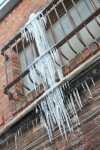Bitter cold brings dangers with it

As temperatures drop across the region, the Bourbon County Chapter of the American Red Cross is urging residents to take steps to guard against hypothermia and other emergencies common during severely cold weather.
"Winter can be a beautiful time of year in Fort Scott, but it also brings quiet dangers such as brutally cold temperatures," Whendi Martin, the chapter's executive director, said. "Everyone, especially senior citizens and children, should take precautions to guard against hypothermia this winter, and the Red Cross can help."
Severely cold weather may cause hypothermia, a serious condition that predominantly affects young children and people over 60 years of age. Symptoms of hypothermia include confusion, dizziness, exhaustion and severe shivering. People who experience any of these symptoms should seek medical attention immediately, according to the Red Cross.
The organization offers the following safety tips to help people protect themselves this winter:
* People should dress in several layers of lightweight clothing, which will keep a person warmer than a single heavy coat.
* Mittens provide more warmth to hands than gloves.
* Most of the body's heat is lost through the head. Wear a hat, preferably one that covers the ears.
* People who experience symptoms of frostbite including numbness, flushed gray, white, blue or yellow skin discoloration, or skin that appears waxy feeling, should also seek medical attention immediately.
* Wear waterproof, insulated boots to keep feet warm and dry and to maintain footing in ice and snow.
* Remove wet clothes immediately and help warm the body's core temperature by wrapping in a blanket or drinking warm fluids like hot cider or soup.
* Take frequent breaks and stay hydrated.
* People who think they might have hypothermia or frostbite should also avoid drinking caffeine or alcohol.
* Be careful with candles. Do not use candles for lighting if the power goes out. Use flashlights only.
* Inspect fireplaces and wood stoves yearly. Use a sturdy fire screen with lit fires. Burn only wood -- never burn paper or pine boughs.
* Use generators correctly. Never operate a generator inside the home, including the basement or garage. Do not hook up a generator directly to the home's wiring. The safest measure that a person can take is to connect the equipment that he or she wishes to power directly to the outlets on the generator.
* To prevent frozen pipes when the weather is very cold outside, open cabinet doors to let warm air circulate around water pipes. Let cold water drip from the faucet served by exposed pipes. Running water through the pipe, even at a trickle, helps prevent pipes from freezing because the temperature of the water running through it is above freezing. Keep the thermostat set to a consistent temperature.
* Make sure smoke alarms are working properly and replace batteries as necessary.
* Be aware of overuse of electrical outlets. Don't overload electrical outlets and be careful that extension cords don't create hazardous walkways.
